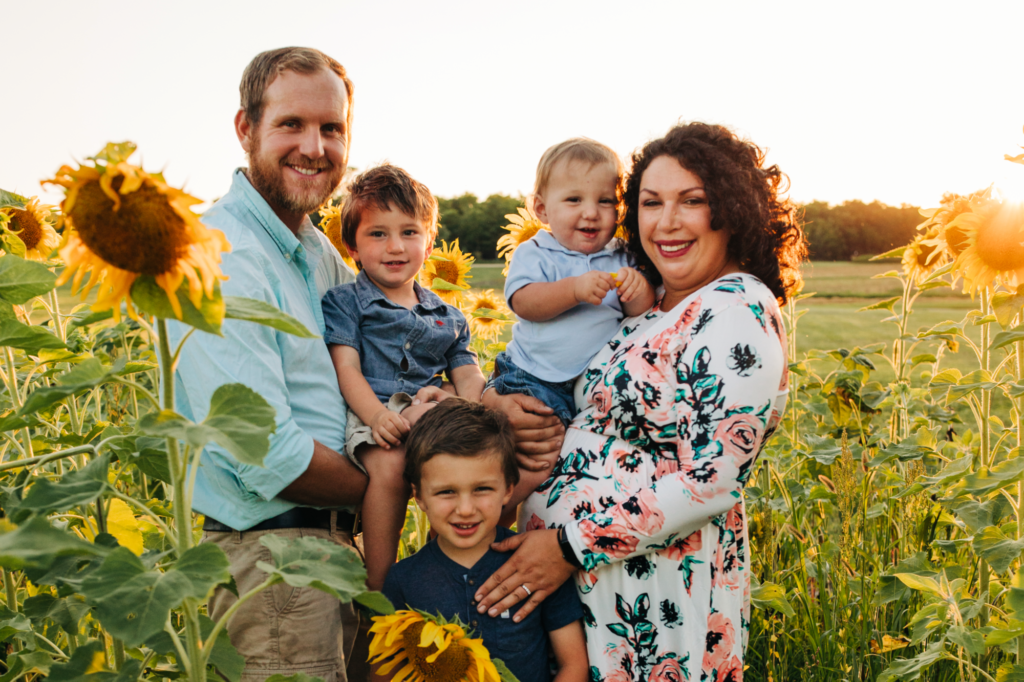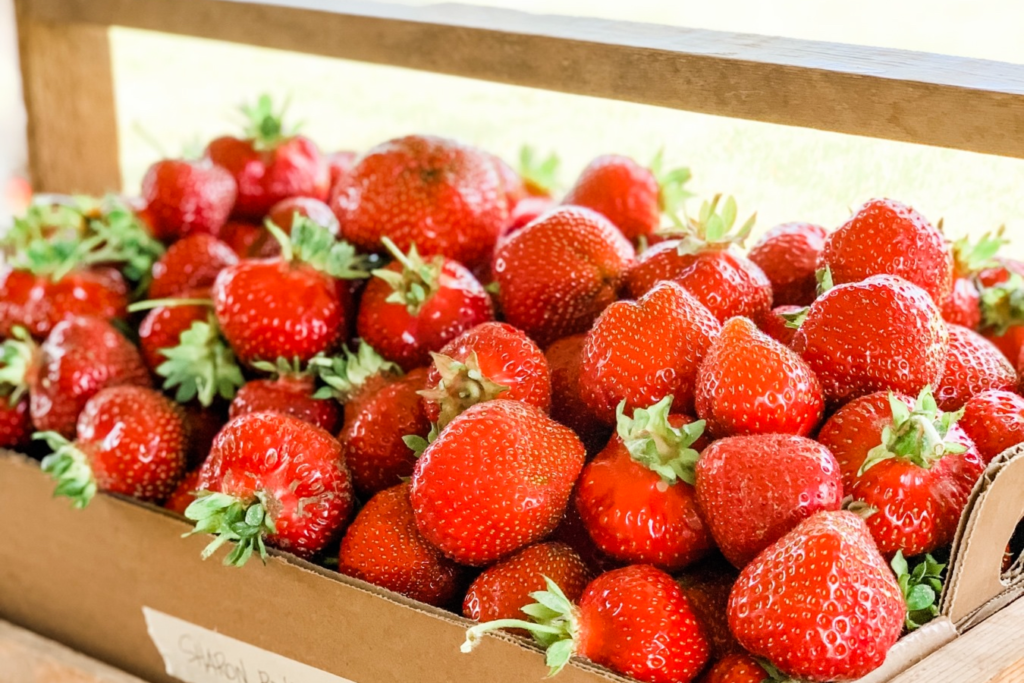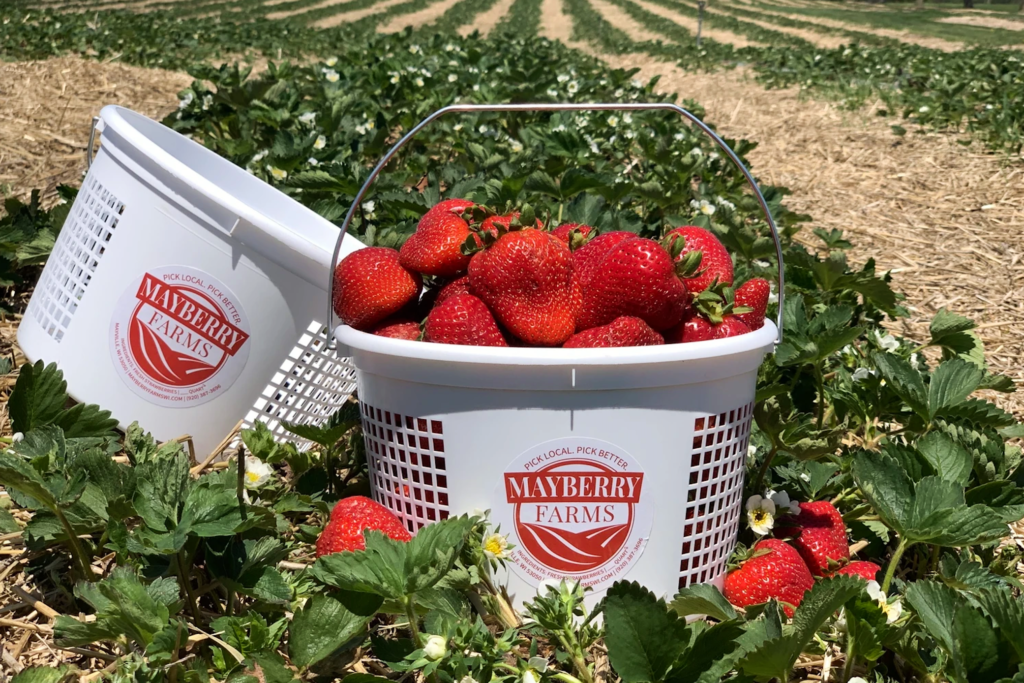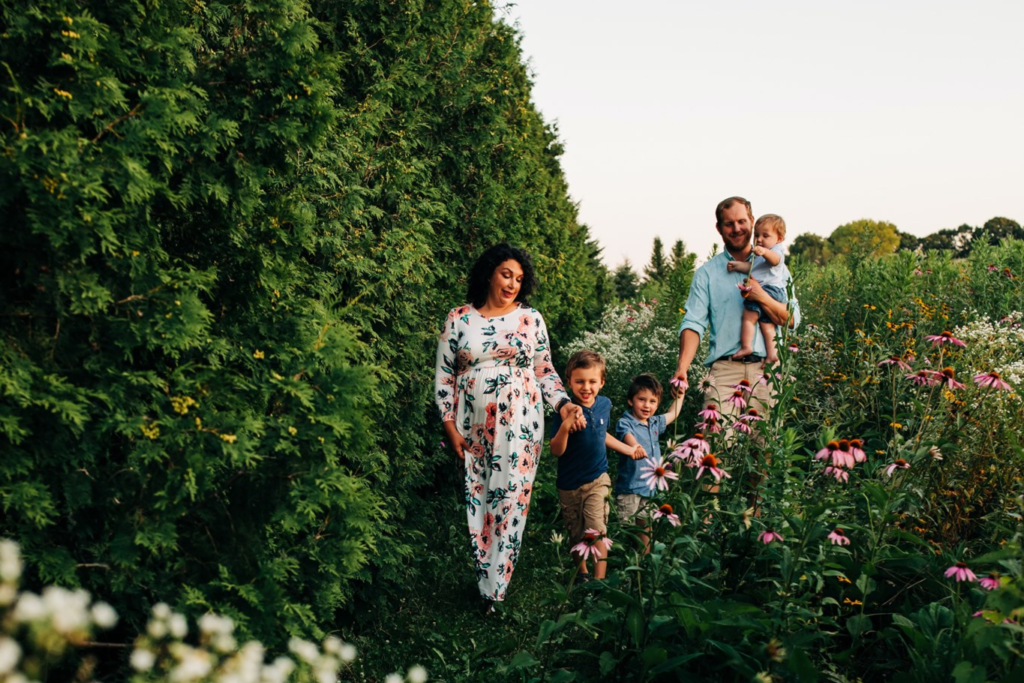
You could say love led Danielle and Tim Clark to become strawberry farmers.
When the two first met and started dating, Tim lived just down the road from his family’s small dairy farm just outside of Mayville, Wisconsin. Danielle soon moved home to her family’s farm is Beaver Dam, just twenty-five minutes southwest. As they fell in love and got married, they dreamed of raising a family on a farm of their own.
Today, along with their three children, they run Mayberry Farms, a pick-your-own strawberry farm that specializes in sustainable practices. Danielle shares more.
What led you to become strawberry farmers and start Mayberry Farms? And when did you start the farm?
In the fall of 2016, a search online led my husband Tim to a familiar property for sale. The strawberry farm we now call home happened to be a staple in the Mayville community for decades.
The property was originally homesteaded by the Steinbach family in 1866. Pick your own strawberries became part of the tradition on the farm in the 1970s and continued when Wayne and Cindy Zastrow purchased it in 1997. After twenty years the Zastrows were ready for retirement on one condition: that the farm maintained the strawberry picking legacy.
Immediately we were ready to jump in. Neither of us having experience with growing or even picking strawberries, we could see the vision for marketing a food product directly to consumers. Agri-tourism was something we both had talked about for our future, we just had no idea what it would look like until March of 2017, when we made an offer to purchase the farm and rebrand it as Mayberry Farms.
Given the farm’s rich history of strawberry picking and that everyone calls our rural community “Mayberry” as a reference to the Andy Griffith show, it was never a question to either of us that it should be named Mayberry Farms. We moved just a month before opening for the strawberry picking season in May of 2017 with the previous owners guiding us through our first season.

Tell us about strawberry season! What’s it like for you and what does this season mean for you each year?
The type of strawberries grown here in south central Wisconsin are known as a June-bearing variety, meaning they only bear fruit in June — or as we like to say “June is berry month at Mayberry Farms.”
We spend April to November managing the crop for a short and sweet harvest season that lasts approximately twenty-one days or about three weeks. Combine the unpredictability of Mother Nature, and the number of days we’re actually open is typically much less. That means we make (rather need to) the majority of our income for the year during this period.
While it is a stressful time of year, it’s fun and exciting. I like to compare it to a wedding celebration. We spend months preparing for it to happen, planning every detail from our website, marketing, employees, cropping plans, etc., and by the time we open and get going, it’s over.
For us, the best part is welcoming thousands of visitors to the farm and having the chance to interact with them. We have met so many incredible people and built countless friendships that we look forward to seeing them even for just a few moments during the busiest time of year.
Because I love to talk with everyone, my role is to focus on the pick-your own side of the business during harvest. I manage the employees, marketing and customer service. Tim focuses on the back end with the pre-picked side of the business and is generally running back and forth between the fields bringing in any strawberries that have been picked by our harvest crew. At the end of the season, we’re utterly exhausted yet energized by the potential for an even better season next year.
Please tell us about your sustainability efforts and why this is important to you.
Sustainability is more than just part of our farming practices, it’s really how we live our life. It motivates us to build a business that will support our family as well as to work in sync with the land.
We practice conservation methods such as crop rotation for pest control and to mitigate weed pressure. The use of cover crops to protect the soil from erosion is part of that crop rotation as well. We annually invest in planting pollinator habitats to attract native species to improve our crop yields.
In the spring of 2020 we made the decision to switch our strawberry picking packaging from wax cardboard boxes to reusable plastic buckets. Customers can return them to the farm for a discounted price on their next purchase then we will wash and sanitize the buckets to be used again.
As a family we grow a large garden and preserve our food each year, and we also raise our own eggs, meat and goat milk.
When and how did you expand into flowers, honey and soaps?
The need to diversify on any farm is important and for us it’s part of our sustainability model. I started keeping bees in 2018 as a way to improve pollination for our strawberry plants.
After seeing the success with a few hives, this year I’ve committed and invested in thirty-two honey bee hives. I work with a mentor who has years of experience with beekeeping and is teaching me along the way. While the main goal is to improve yields for our strawberries and other crops, I have learned that by being a better beekeeper, we can also harvest and sell raw honey. Our reputation for quality honey production has become a huge part of our business and continues to grow.
In 2018, Tim added wildflowers to attract even more pollinators and help my beekeeping efforts. It worked so well for us we decided to start growing sunflowers because they were easy to plant using a small corn planter. Currently we cut and sell them to local floral shops and allow photographers to utilize them during the summer as well. My ultimate goal is to create a cut-your-own flower experience and also grow plants or flowers that are beneficial to the bees as well as to be used in the Mayberry Milk & Honey Co. soap and skincare line.
I learned how to make soap in the fall of 2020 using milk from our family milk goat and the raw honey we were abundantly blessed with. We’ve since added an online shop and ship all over the United States, plus we offer delivery to local customers everything from handmade soaps of all different varieties, lotions and creams to lip and body balms.

What are the best parts of running your farm? What are the biggest challenges?
The best parts of owning our farm has to be the lifestyle. The ebb and flow of the seasons always bring new opportunities as well as new challenges. Each spring we have the chance to start again and improve from the previous year. Sometimes in the middle of the season we have to pivot, and so we’ve learned to be resilient in every way.
The best reward is a bountiful harvest and happy customers. Seeing families like ours spending time here makes us get out of bed each morning to make those experiences possible.
Just like everyone, we face our fair share of challenges. Limited capital and the expense to produce crops have brought stress to our home and family.
Mother Nature is still our biggest challenge. There is never a guarantee we will have a crop to harvest making our financial situation always uncertain. Strawberries are incredibly sensitive to temperature and moisture levels. Not to mention, there’s very limited machinery or technology to be used when growing strawberries. Thankfully, Tim continues to work off the farm full time to provide a steady income and to afford health insurance for our growing family. With that he often travels for his job, or works late evenings here in order to complete tasks around the farm that he is responsible for.
People always ask us how we manage it all with young children and while Tim works off the farm. Honestly, we’re not sure how we would manage without our village. We have an incredible support system of family and friends who are the kind of people who just show up even when you don’t ask them to.
What’s it like being farmers and parents? How do the two intersect for you?
Raising a family on the farm was our dream when we first met and talked about the future so it’s humbling to be able to live that dream. Although, having the type of farm we do where thousands of people are pulling onto the yard each summer is something we don’t always know how to manage with them.
Our kids are five, three and one, so at this point in their short lives, they don’t know any differently, whereas we’re still trying to figure that out as parents. Not to mention the intensity it takes to physically manage a strawberry crop, working in the field is not always possible with our kids right now. We know at some point they will be old enough to help, and we’re not trying to wish these years away. Having animals like chickens and goats allows them to participate in an environment where we can help and keep them safe.
There’s a lot of tag-team parenting that goes on which we’re lucky to be able to do living on the farm where we work. Sometimes things don’t get done and we just look at each other and say, “The kids are safe and happy, field work can wait.”

What does it mean to you that your sons are growing up on this farm? What do you hope they learn from it?
I remember being asked this same question when we first moved here and we were expecting our second child. We can honestly say we still have the same answer we did then. We want for our kids the same that any other parent wants. For them to be healthy, happy, get a good education, learn the value of hard work, go on to be self-sufficient and a contributing member to society. If they want to work on the farm, great, they are more than welcome here. If they find a different farm or other passion they wish to pursue, we’ll always be there to support them just as our parents did and still do today. We hope they learn that no matter where they go in life or what obstacles they are faced with, they can do anything they put their minds to, especially if they work hard.
What are your favorite things to do as a family?
As a family we are pretty much always around home. When the stay-at-home orders took place in March of 2020, it wasn’t a big change for us. We love to take walks around the farm to check on our crops or look at the diverse wildlife along the Rock River. We also have a John Deere Gator that’s big enough for all of us to fit in and go for nightly rides around the farm in the summer. We love to grill out on the driveway while the kids play with their toys, ride bikes or chase the dogs. In the summer we spend time in our garden together and of course make trips to the field to eat as many strawberries as possible.
What do you prioritize as a family? What do you always make time for?
As a family we prioritize eating together at night time. I love to cook and bake for my family, they love to eat what I prepare. We always make time to pray together and thank God before every meal. We attend weekly Mass as a family and our kids also attend a private Catholic school and daycare. Without our faith we have nothing.
What are you looking forward to this summer?
This summer we’re offering two week-long farm camps here for the very first time. We have eighty campers signed up throughout those two weeks and a good supply of volunteers to help us as well! We’ll be giving kids ages six to fifteen the opportunity to learn firsthand what life is like on our farm. We will focus on livestock management, cropping and conversation farming, beekeeping and pollinator habitats, as well as swimming in the stock tank and eating ice cream. The excitement from the local community for us to offer this program has been amazing and we are so excited to share our love of farming with the next generation.
– Katie Vaughn
Photos courtesy of Mayberry Farms.
Katie Vaughn is the editor and co-founder of Northerly. She is a University of Wisconsin-Madison and Stanford University-trained journalist with experience as a writer, reporter, editor, blogger and author. She lives in Madison with her husband, daughter and son, and is always up for an adventure.